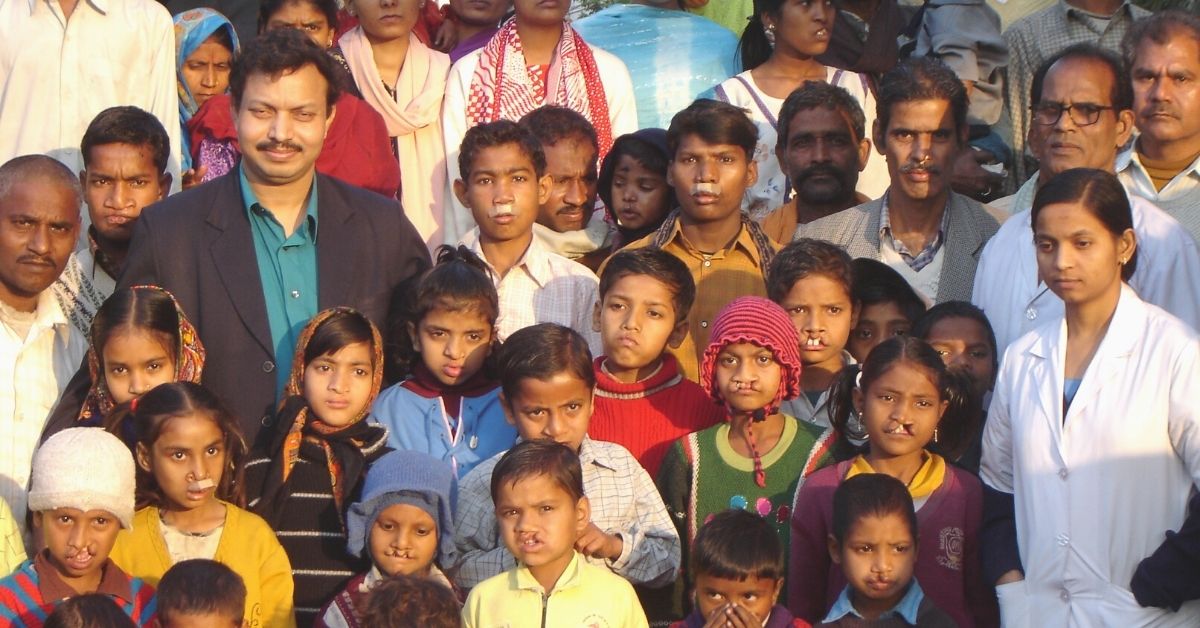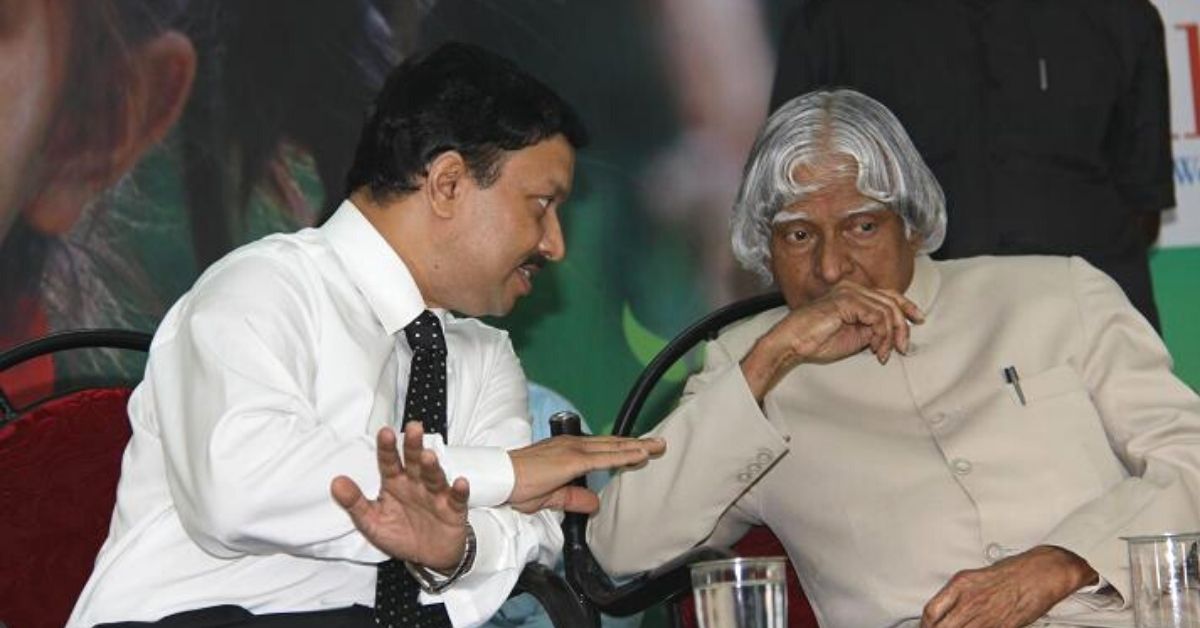Dr Subodh Kumar Singh was 13 when his father, Gyan Singh, died of a heart attack. “The untimely death of our father was probably due to the inadequate medical treatment at the hospital,” he says.
Hailing from Varanasi, Dr Subodh is the youngest sibling among the four. He recalls that his brothers were compelled to quit their education and earn a living for the family, thus putting them through a difficult childhood.
“We started selling homemade candles, soaps and goggles on streets and in local shops. My father was a clerk at the railway department, and my eldest brother received a job on compassionate grounds. The gratuity received after my father’s death and my brother’s income went into repaying our debts. This was not enough to run a family,” he tells The Better India.
Dr Subodh says, however, his elder brothers ensured that he resumed his studies and did not compromise on his ambitions of becoming a doctor.
Doctor For a Cause

“I wanted to do my best to justify the sacrifice of my brothers. During my Class 10 examinations, I worked at a general store and cooked for the family while managing my studies. Our mother kept ill, so the entire responsibility of the family came on the four of us,” he says.
The financial support from his brothers allowed him to pursue medical education. In 1983, he cleared the Armed Forces Medical College (AFMC, Pune), Banaras Hindu University (BHU-PMT) and Uttar Pradesh state Combined Pre Medical Test (CPMT). He chose to study at the Institute of Medical Sciences affiliated with BHU and aid his widowed mother.
“Further, I completed my post-graduation in general surgery and specialised in plastic surgery,” he says.
However, Dr Subodh wanted to become a professor in a medical college but could not find a vacancy. “I started my practice in 1999, and in 2004 I established a small hospital G S Memorial, as a tribute to my father,” he informs.
Dr Subodh says that his difficult days as a child prompted him to contribute to a social cause. “My situation in childhood and teens gave me the strength to build resilience and develop an understanding for people who undergo a daily struggle. The hardships made me perceive their emotions and relate to them. Becoming a doctor put me in a position to help many. I wanted to make the lives of the less privileged people better,” he says.
The 56-year-old started organising free medical camps for patients after realising that babies born with cleft lips needed a lot of help. “Having a deformed cleft comes with many difficulties. Being a plastic surgeon, I could help the children,” he adds.
Dr Subodh shares that babies with clefts find it difficult to breastfeed. “These babies cannot access milk as required. Many die due to malnourishment and often have their growth stunted. The children find it difficult to use the tongue to speak, causing speech problems,” he says, adding that the deformity also leads to ear infections.
“To explain in simple terms, a pipe between the throat and ear is responsible for controlling the air pressure. Cleft palate deformity affects the structure leading to fluid accumulation and growth of unwanted bacteria that leads to ear infections and often perforation of the eardrum. This leads to partial deafness,” Dr Subodh says.

He further explains that individuals with clefts also undergo a social stigma. “The children often drop out of school due to their speech or being bullied. They find it challenging to seek jobs or find acceptance. On many occasions, the mother is blamed, cursed and abandoned for conceiving a child with a cleft lip. It also has psychological effects on parents. But surgery can solve it all,” he says.
He started performing free surgeries for children in 2004. So far, his initiative has benefited over 37,000 children and 25,000 families.
Moreover, his methodology has been adopted by doctors across the states like West Bengal, Uttar Pradesh, Jharkhand, Bihar, Madhya Pradesh, Chhattisgarh and others.
Anuj Das, a resident of West Bengal, says that his younger brother was born with a cleft in 2010 and faced multiple health issues. “We learned about the free camp organised for cleft at Asansol and registered for the same. My brother has undergone seven surgeries for nose, palate, lips and other parts of the mouth that have helped improve his speech and facial aesthetics,” he says.
Anuj says that there would be another surgery to go, and each time the health benefits for his brothers increase.
Recognising his work, Smile Train, a USA-based NGO that offers corrective surgeries for cleft and palate, joined hands with him.
“The NGO agreed to meet the expenses for the patients while I conducted surgeries and trained doctors. I have trained 40 doctors to date. Many hospitals have collaborated with Smile Train to perform corrective surgeries for free. The total number of surgeries performed in India are over 60 lakh, one of the highest in the world,” Dr Subodh says.
Explaining his methodology, Dr Subodh says, “The children are screened to identify the issues in the cleft and surgery is performed, accordingly. However, a trained dietician assists the mother and her child. They constantly monitor both to ensure the surgery is working well and benefiting the baby. A weight and diet chart is maintained for the same.”
He adds that nutritional supplements in powdered form are given to the child and fed through artificial nipples or bowls. “The effort is helping save lives,” he claims.
Watch trailer of Dr Subodh’s award winning documental Smile Pinki
Speaking of challenges, Dr Subodh says, “Performing surgeries is not a difficult task as a surgeon improves with experience. However, one has to be careful in understanding the complexities of the deformities, and positioning the muscle and tissues to correct the anatomical and functional part in a patient.”
He says that high care needs to be taken at all times, complimented by speech therapies and other assistance during the course.
Dr Subodh plans to set up a national centre for performing cleft surgeries. “It is my long-cherished dream to start the finest centre for cleft surgeries in the world,” he shares.
“I want to include more doctors from poor financial backgrounds in this endeavour. Many students approach me for jobs who are poor farmers or have a father working as rickshaw pullers. But, I tell them that being poor is nothing to be ashamed of and is not a crime. I share my story and convince them that hard work and sincere efforts can bail them out of the situation,” he says, adding, “I can say this with conviction because I have gone through the journey.
For now, Dr Subodh says he feels blessed to be contributing to the social cause. “I feel proud to have the power to change the lives of many. One surgery positively impacts more than one family and the life of an individual. Nothing gives me more joy than to reunite the families who accept their daughter-in-law after the surgery and do not blame her for the deformity,” he adds.
Edited by Yoshita Rao
No comments:
Post a Comment